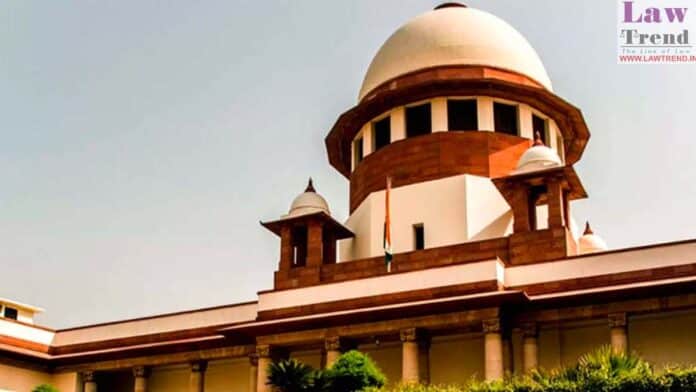The Supreme Court on Monday stated that a judicial officer cannot pronounce the concluding portion of his judgment in open court without the entire text of the judgment being prepared/dictated.
The bench of Justices V. Ramasubramanian and Pankaj Mithal was dealing with the appeal challenging the order passed by the Karnataka High Court, setting aside a penalty of dismissal from service imposed upon the respondent, who happened to be a Civil Judge (Junior Division).
The court observed:

It is true that some of the charges revolve around judicial pronouncements and the judicial decision-making processes and that they cannot per se, without anything more, form the foundation for departmental proceedings. Therefore, we are ignoring those charges. But the charges which revolve around gross negligence and callousness on the part of the respondent in not preparing/dictating judgments, but providing a fait accompli, is completely unacceptable and unbecoming of a judicial officer.
In this case, The respondent was appointed as a Civil Judge (Junior Division) vide a notification. On certain allegations of gross misconduct, the respondent was placed under suspension by an order dated 25.01.2005, followed by the initiation of disciplinary proceedings, with the issue of Charge Memos.
As per the enquiry reports, some charges stood proven and the other charges were not proved. Therefore, second show cause notices were issued and thereafter the High Court of Karnataka resolved on 04.10.2008 to impose the penalty of dismissal from service upon the respondent.
Based on the resolution of the Full Court, an order of dismissal from service was passed by the Governor of Karnataka, vide order dated 19.03.2009.
Challenging the findings of the enquiry officer, the respondent filed a set of three writ petitions and challenging the order of dismissal from service, the respondent filed a separate writ petition. All these writ petitions were dismissed by a Judge.
Aggrieved by the same, the respondent filed intra-court appeals. Those appeals were allowed by the High Court by a very strange order, not only setting aside the order of penalty and the findings of the enquiry officer but also directing that no further inquiry can be held against the respondent.
The issue for consideration before the bench was:
Whether the order passed by the High Court needs interference or not?
Supreme Court stated that it is seen that among the charges held proved, some related to the judicial orders passed by the respondent. Therefore, we are prepared straightaway, to ignore those charges and see whether the order of penalty of dismissal from service was justified qua the other charges and whether the High Court was right in setting aside the same.
The bench noted that a judicial officer cannot pronounce the concluding portion of his judgment in open court without the entire text of the judgment being prepared/dictated. All that the respondent has done in the departmental enquiry is just to pass on the responsibility to the inefficient and allegedly novice stenographer. We do not know how the findings with regard to such serious charges have been completely white-washed by the High Court in the impugned judgment.
Supreme Court opined that “Unfortunately, the High Court did not test the correctness of the order of penalty in this case, on the above parameters. Instead, the High Court has recorded a finding in the impugned order, as though the judges had first-hand information about the problems that the judicial officers faced at the lower level. The opinion of the High Court that the acts of omission and commission attributed to the respondent do not constitute grave misconduct, is very-very curious. Adding fuel to fire, the High Court has recorded that “dismissing him from service itself is very atrocious”. Such a finding is nothing but a veiled attack on the Full Court of the High Court. After holding so, the High Court has gone to the extent of certifying the respondent as an innocent and honest officer. We do not know wherefrom the High Court came to such a conclusion.”
The bench observed that it is not the case of the respondent that the High Court took a decision to impose the penalty of dismissal from service even before furnishing the copies of the enquiry reports to the respondent. The show cause notices enclosing the enquiry reports are dated 11.10.2007. The representations made by the respondent are dated 26.10.2007. It is only thereafter that the Administrative Committee No.1 considered the matter on 28.08.2008 and it was placed before the Full Court on 04.10.2008. Therefore, the opinion of the High Court that the second show cause notices were in violation of the principles of natural justice is not factually and legally correct.
Supreme Court stated that we have not come across a case where the High Court while setting aside an order of penalty has held that there shall not be any further inquiry against the delinquent. But in this case, the High Court has done exactly the same, creating a new jurisprudence.
In view of the above, the bench allowed the appeal.
Case Title: The Registrar General v. High Court of Karnataka & Anr.
Bench: Justices V. Ramasubramanian and Pankaj Mithal
Case No.: SPECIAL LEAVE PETITION (CIVIL) NOS. 25714-17 OF 2019
Counsel for the appellant: Mr. Basava Prabhu S. Patil
Counsel for the respondent: Ms. Anitha Shenoy







